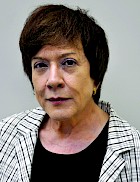By Maria Fernanda Forni, Postdoc Fellow, University of São Paulo
 DOT: Tell us about your background and current passion in your professional life.
DOT: Tell us about your background and current passion in your professional life. I had little contact with science while I grew up in Brazil. That held true up to my early University years. I decided on a degree in Chemistry at the University of São Paulo mostly because of its practical applications as in that period I taught this discipline at a public High School. Nonetheless, just before getting my degree, I met a young Assistant Professor named Francisco Nóbrega, which stimulated me to pursue a scientific career in Biochemistry. As soon as I borrowed his "Lehninger's Principles of Biochemistry," I felt in love with this subject. That led me to pursue a graduate degree at the same institution. My farseeing supervisor, Giuseppe Cilento, offered me a project related to molecular oxygen activation involving a possible role for the superoxide anion radical. It was 1972, three years after the classic paper by McCord and Fridovich!
After extensive work, we published two articles in Arch Biochem. Biophys. I then became interested in learning how to directly detect radicals using EPR (electron paramagnetic resonance) and sought to attempt that in a postdoctoral period in the USA. I spent one year in Lester Packer´s laboratory at UC Berkeley learning EPR, and next, moved to Paul Ortiz de Montellano´s lab at UCSF to apply EPR-spin trapping to study drug metabolism. We did excellent work in providing the first evidence that cytochrome P450 can oxidize some substrates through a one-electron mechanism and by evidencing the involvement of carbon-centered radicals in the suicidal inactivation of hemeproteins. Although I had a great time in the USA, I returned to Brazil, and teamed with Shirley Schreier to create an EPR facility at the University of São Paulo and continued working in the redox biology area.
As mentioned before, I started my scientific career in the redox area and never left. Therefore, my research interests focus on redox biology, particularly on the role of oxidative processes in protein aggregation, mechanisms of protein thiol oxidation and nitrosation and oxidants derived from the bicarbonate buffer. I think that the most notable achievement of my lab was the direct detection by EPR of the carbonate radical produced in the reaction between peroxynitrite and carbon dioxide (CO2) along with nitrogen dioxide. At that time, many researchers doubted that peroxynitrite would produce radicals but, from the publication of our work, nitrogen dioxide and carbonate radical became accepted as important biological oxidants.
My main advice is that if you do enjoy doing Science, try to be resilient and don't give up. Most often things become difficult due to money shortages and other challenges. If money is an issue, establishing good scientific collaborations can be the answer. They may reduce the amount of money required for some projects while it will also amplify the range of your scientific approaches and broaden your horizons. I also think that it's paramount to get involved in activities to promote the dissemination of science to the general public, such as the recent March for Science on April 22, 2017.
It is almost impossible to be a female scientist without facing gender bias. In most instances, it was subtle but clear, evocating a feeling that was far from being constructive. I think gender bias is slowly decreasing, but we have a long way ahead of us to change these stereotypes. Breaking stereotypes of gender, race, and class requires profound cultural changes and these processes are slow. We need to keep trying, particularly by focusing on the education of young people and the next generation.
Most of my previous students and postdocs are in the academia or other public institutions. This fact is mainly due to the conditions in Brazil, where research in the industry remains incipient. This scenario seems to be changing. At our "Research, Innovation, and Dissemination Center on Redox Process in Biomedicine (RIDC Redoxoma)", we are offering students and postdocs a full range of possible career choices in academia, industry and science education and dissemination. However, despite the option chosen between these prospective jobs, I personally always recommend a solid Ph.D. in Biochemistry.
When I try to underscore the importance of the Redox Biology field, I find particularly relevant what Dr. Doug Spitz pointed out in a recent interview published in the DOT: "...Since I still subscribe to the theory that we are all complex higher order biological structures that have evolved to extract store and move electrons to derive our life force, I believe that understanding the relationships linking redox biochemical reactions with biological phenomena will permeate all fields of biomedical research for many years to come....". However, to fulfill its promises to medicine, redox biology has to go through some major changes. Many researchers in this field insist on using the term "ROS" knowing that it mixes up species of completely different chemical reactivity. Worse, the term is disseminating through the general scientific community, and this may hurt the redox area in the future. The development of more accurate probes and assays for detecting specific radicals/oxidants is mandatory to advance the understanding of their role in the disease onset. The redox biology area is also likely to move to more integrative approaches encompassing genomics, epigenomics, proteomics metabolomics and systems biology.
Tremendously! All the omics and novel microscopy techniques are completely changing the face of biology and will keep doing so at an incredible pace. Despite all the scientific advances, I miss the time when the researchers in the redox field would care more about the chemistry underlying the biological processes.
Nowadays, the demands are high in all types of jobs, and most people have problems balancing personal life and career. I am no exception to that.
I enjoy attending concerts, art expositions, movies, and theater plays. I also enjoy reading, but lately, I haven't had much time for reading literature unrelated to science.